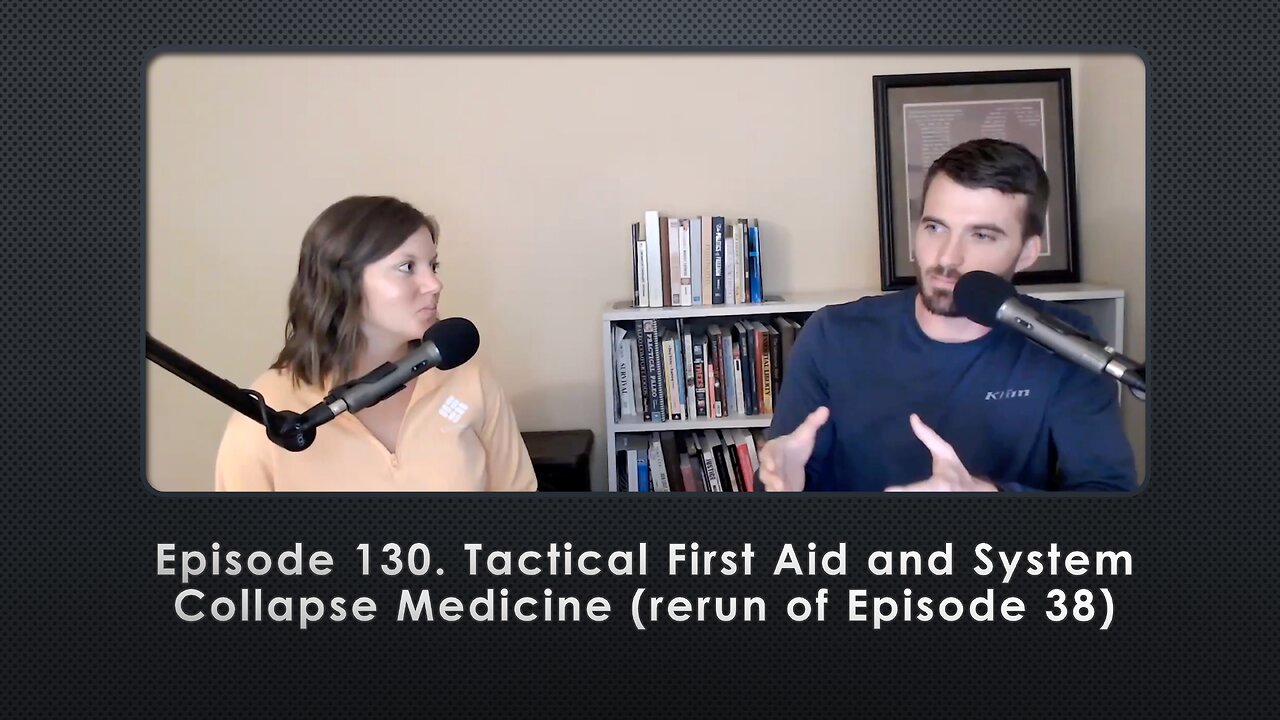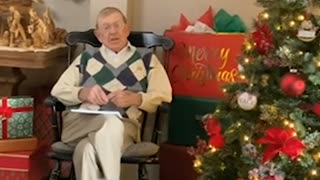Premium Only Content

Episode 130. Tactical First Aid and System Collapse Medicine (rerun of Episode 38)
Show Notes
Episode 130. Tactical First Aid and System Collapse Medicine (rerun of Episode 38)
Alex Ooley is joined by his wife, Whitney, to discuss “Tactical First Aid and System Collapse Medicine,” a class they took with Greg Ellifritz from Active Response Training. They cover topics such as the importance of first aid skills, the Tactical Combat Casualty Care Protocol, and practical exercises in applying pressure bandages and tourniquets. The conversation delves into the MARCH acronym, the use of hemostatic dressings, and the misconceptions about tourniquets. The conversation covers a comprehensive overview of tactical combat casualty care, including techniques for managing massive bleeding, airway obstruction, respiration, circulation, and head trauma. It also delves into wound cleaning, wound closure, and assembling a medical kit for emergency preparedness. The discussion emphasizes the importance of being prepared and knowledgeable in case of a medical emergency.
Chapters
00:00 The Importance of First Aid Skills
09:42 Understanding the MARCH Acronym
26:31 Hemostatic Dressings and Tourniquet Misconceptions
27:59 Tactical Combat Casualty Care: Essential Skills for Emergency Situations
29:52 Addressing Massive Bleeding, Airway, and Respiration: Preventable Battlefield Deaths
37:55 Respiration and Breathing: Tension Pneumothorax and Treatment Measures
45:11 Circulation, Head Trauma, and Hypothermia: Non-Preventable Battlefield Deaths
Resources
https://www.activeresponsetraining.net/
https://www.activeresponsetraining.net/upcoming-classes
Takeaways
The importance of first aid skills in emergency situations
Understanding the MARCH acronym for treating traumatic injuries
Practical exercises in applying pressure bandages and tourniquets
The use of hemostatic dressings and misconceptions about tourniquets Tactical combat casualty care (TCCC) provides essential skills for managing life-threatening injuries in emergency situations.
Understanding wound cleaning and closure techniques is crucial for preventing infection and promoting healing in the absence of advanced medical care.
Assembling a well-equipped medical kit and being prepared for emergencies can make a significant difference in providing effective first aid and saving lives.
Knowledge of tactical combat casualty care empowers individuals to respond effectively to medical emergencies and potentially prevent preventable battlefield deaths.
The importance of being prepared and knowledgeable in case of a medical emergency cannot be overstated, and TCCC training provides valuable skills for addressing life-threatening injuries.
Sound Bites
"Tactical First Aid and System Collapse Medicine"
"Far more likely to need first aid skills than our gun"
"The MARCH acronym - Massive bleeding, Airway, Respiration, Circulation, Hypothermia"
"You really don't want that kind of time to pass because those are valuable seconds and valuable blood loss."
"We're primarily focusing on the MAR, the massive bleeding, the airway and the respiration, because that is going to resolve over 90% of preventable battlefield deaths."
"It makes me feel better that I know what to do in case that ever happened that I would be able to hopefully help someone if I ever needed to."
Keywords
Tactical First Aid, System Collapse Medicine, First Aid Skills, Tactical Combat Casualty Care Protocol, MARCH Acronym, Hemostatic Dressings, Tourniquets, Pressure Bandages, tactical combat casualty care, emergency preparedness, wound management, medical kit, battlefield deaths, respiration, circulation, head trauma, wound closure, wound cleaning
Tags
#personalresponsibility
#individualliberty
#liberty
#freedom
#forgeoffreedom
#TacticalFirstAid
#SystemCollapseMedicine
#FirstAid
#Skills
#TacticalCombatCasualtyCareProtocol
#MARCH
#HemostaticDressings
#Tourniquets
#PressureBandages
#emergencypreparedness
#woundmanagement
#medicalkit
#respiration
#circulation
#trauma
#wound
DISCLAIMER: This podcast is for informational purposes only and should not be considered legal, medical, or financial advice. The views expressed in this podcast are those of the hosts and guests and do not necessarily reflect the views of any organizations or individuals they may mention. The hosts and guests are not liable for any damages that may result from someone listening to this podcast.
-
 18:12
18:12
The Forge of Freedom
2 months agoEpisode 155. Self-Defense and Civil Liability: Lessons from a Detroit Shooting
381 -
 4:33:48
4:33:48
tacetmort3m
1 day ago🔴 LIVE - THE ZONE KEEPS PULLING ME BACK - STALKER 2 - PART 15
57.9K12 -
 22:45
22:45
Brewzle
19 hours agoI Went Drinking In A Real Bourbon Castle
43.4K4 -
 48:36
48:36
PMG
1 day ago $3.71 earned"Parkland Parent Speaks Out On Kamala Harris Using Victims"
35.4K7 -
 4:06
4:06
The Lou Holtz Show
18 hours agoCoach Lou Holtz’s Heartfelt Christmas Message 🎄 | Family, Faith & Notre Dame Spirit 💚 #christmas
24.2K -
![ROSEANNE BARR - Her Journey, TRUMP, and the MAGA GOLDEN AGE! [INTERVIEW]](https://1a-1791.com/video/s8/1/M/m/B/2/MmB2v.0kob.1-small-ROSEANNE-BARR-Her-Journey-T.jpg) 51:35
51:35
Dr Steve Turley
1 day ago $20.32 earnedROSEANNE BARR - Her Journey, TRUMP, and the MAGA GOLDEN AGE! [INTERVIEW]
60.7K54 -
 57:38
57:38
The Tom Renz Show
15 hours agoMerry Christmas - The Tom Renz Show Christmas
96.1K17 -
 2:59:10
2:59:10
Wendy Bell Radio
1 day agoThe Bridge Too Far
173K302 -
 1:03:45
1:03:45
Donald Trump Jr.
1 day agoHappy Festivus: Airing Our Grievances and Stopping The Swamp w/Sean Davis | TRIGGERED Ep.201
431K553 -
 1:30:30
1:30:30
Game On!
1 day ago $8.15 earnedTop 5 things you need to know for Sports Christmas!
76.4K5